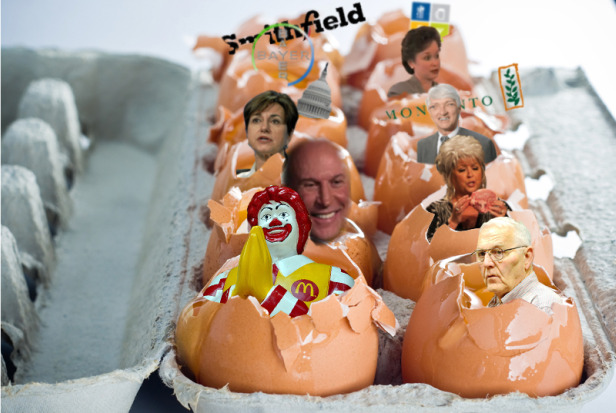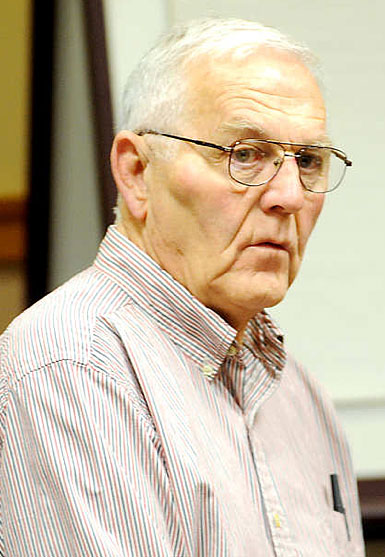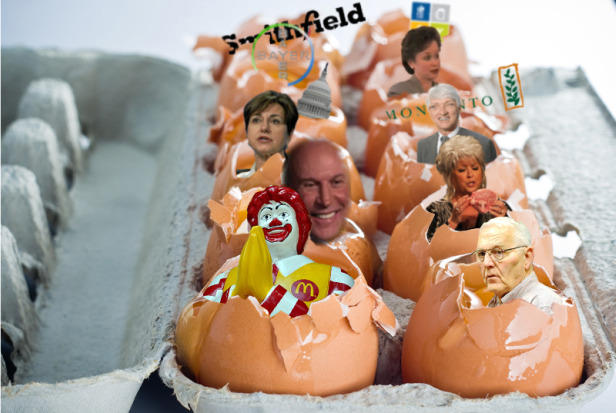 Composite: Grist
Composite: Grist
Oh, America, have we got troubles with our tummies — and with the industrial system that pumps junk into them. One in six kids is obese. Half a billion potentially tainted eggs were recalled after sickening thousands with salmonella this year. (On the bright side, it’s a pleasant change from summer’s usual E. coli alerts.) Giant hog factories make life unbearable not just for the pigs, but for their neighbors in Iowa and North Carolina (although some fight back).
Basically, if you’re someone who tries to eat like you give a damn, you can quickly feel like it’s all going to hell.
Sure, there are many ways to cheer yourself up. You can devour a pint of protest ice cream (one delicious gut reaction). You can seek out happy stories about New Agtivists and “game changers.”
Or, you can get even. While we at Grist like to focus on the positive as much as possible, all the community gardens and organic farmers in the world can’t stop the tsunami of 99-cent feedlot burgers and head-scratching political appointments. This is our attempt to root out who’s currently keeping America sick, fat, and poisoned: a preliminary list of a Dirty Dozen rotten eggs spoiling our food system. Cast your vote, or write in your candidate in the comments below, and let’s see who’s food’s Public Enemy No. 1 — and plot what we can do to stop them.
And now, read more about the culprits’ crimes on the following pages, then vote for your villain of choice in our poll below:
—
Update: The results are in:
Who is food’s Public Enemy No. 1?
- 57.2 percent — Monsanto
- 14.9 percent — The Ag Committees, House and Senate
- 8.3 percent — Ronald McDonald, fast-food icon
- 9.7 percent — Smithfield
- 2.4 percent — Bayer CropScience
- 2.3 percent — Rick Berman, lobbyist
- 2.3 percent — Jack DeCoster, chick magnate
- 1.4 percent — Paula Deen, TV food personality
- 1 percent — Norman Borlaug, father of the Green Revolution
 Photo: Wikipedia CommonsMonsanto
Photo: Wikipedia CommonsMonsanto
Where to start? The list of Monsanto’s misdeeds against the food system — and Earth — is so long that when you start typing the St. Louis-based company’s name into Google, the second suggestion is “Monsanto evil.” (Among those results are a 10th grader’s entertaining exploration of that very topic.) The chemical and seed behemoth has given the world Agent Orange, PCBs, DDT, the possibly carcinogenic sweetener Aspartame, and recombinant Bovine Growth Hormone (which makes cows produce more milk, along with more mastitis and lameness). It dominates not only the markets for genetically engineered corn and soy, but the entire market for seeds in general. And while the company loves to talk about how much it hearts farmers, it seems to heart suing them off the land even more.
Oh, Jacko, pondering your villainy leaves us traumatized like a hen trapped in one of your fetid cages. Way back in ’96, you inspired the U.S. Secretary of Labor to call your Maine egg factory “an agricultural sweatshop” where “the workers are treated like animals.” Given the way you treat animals, those are strong words! Since then, your life story reads like a rap sheet of crime against the environment, workers, public health, and animals alike. You’ve been convicted of knowingly exploiting undocumented workers (and that’s apart from this vile case); and declared a “habitual violator” of clean-water laws by the Iowa a
ttorney general. In your spare time, cagey old rooster that you are, you secretly built out the largest egg empire in the United States. Now that that empire has unleashed a half a billion salmonella-tainted eggs onto an unsuspecting public, even your own business partners and biggest buyers are scrambling to get away from you. Hate to say it, dude, but your career in agribusiness stinks like sulfur.
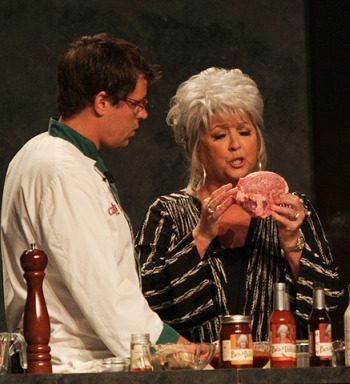 Photo: Chase McAlpinePaula Deen, TV food personality
Photo: Chase McAlpinePaula Deen, TV food personality
It’s not this Food Network star’s cooking that we object to — we’ve got nothing against deep-fried balls of butter. No, it’s her shameless shilling for giganto pork producer Smithfield, another of our villains, despite the company’s miserable environmental record and union-squashing tactics. Dame Paula says her sponsor has nothing to apologize for and nor does she, as Smithfield shares “my family values and traditions.” Maybe Deen was raised by Attila the Hun?
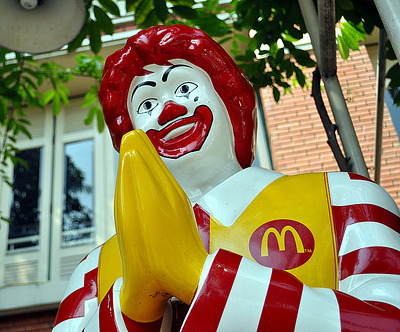 Photo: Davidlohr BuesoRonald McDonald, fast-food icon
Photo: Davidlohr BuesoRonald McDonald, fast-food icon
It might seem like we’re clowning around with this pick, but marketing to kids is as frightening as clowns themselves. A 2008 report by the Federal Trade Commission found that in 2006, Big Food spent $1.6 billion hawking their sweetly fattening wares to children and teenagers. Soda companies spent the most, closely followed by fast-food chains and breakfast cereal companies. So why Ronnie instead of Coca-Cola? Say it with us: Clowns are just creepy.
 Photo: ValerieThe Ag Committees, House and Senate
Photo: ValerieThe Ag Committees, House and Senate
When people start fantasizing about how to fix the U.S. food system, they typically wake up at the Farm Bill, the nightmarishly complex legislation that rears up twice a decade to shape food policy. These naive would-be reformers think to themselves: All we need to do is make the Farm Bill stop propping up ruinous commodity farming, and start supporting production of healthy food for people to eat. Well, that two-headed, yet seemingly brainless monster known as the Congressional ag committees eats such naive reformers for breakfast. Fattened by steady influxes of agrichemical industry cash (House here, Senate here), the beast has successfully torched any Farm Bill reforms. The Congressional ag committees also savaged the Waxman-Markey climate bill last year, and just this summer ensured that the schoolkids who need access to good food most will instead keep munching on junk from its agribiz sponsors. Like most monsters, we suspect this one just needs the right knight to step up. President Obama, please quit crouching in the corner and hoping Michelle can sweet-talk the beast to move out of its foul cave!
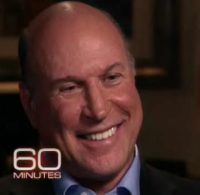
You’ve probably never heard of Berman, but those who have call him “Dr. Evil,” or the Astroturf King, for his many fake grassroots front groups set up on behalf of Big Food, tobacco, and alcohol. They’re set up as nonprofits, allowing his corporate clients to write off their “donations” — and their payments to Berman. Take our favorite of his creations, the Center for Consumer Freedom, which hauled in more than $20 million through 2008, more than $9 million of which went to Berman, according to an analysis of his IRS tax returns. The Center has spawned the enlightening websites SweetScam.com (sugar is sugar, ignore those high-fructose corn syrup haters), FishScam.com (mercury isn’t harmful at all), Trans-Fats.com (they unclog arteries! really!), and PETAKillsAnimals.com (the animal-rights group euthanizes kittens). We’re making the Center sound loony, sure, but its “scientists” often manage to land quotes and op-eds in newspapers.
Raising hogs in tight quarters is by definition a filthy business; and so is slaughtering and packing them hourly by the thousands. North Carolina-based Smithfield does both — more so than any other company on the planet. Every year, the company raises 14 million hogs in its factories and slaughters 27 million. (Its Tar Hill facility alone kills and packs more than 30,000 every day.) It does so with all the style and grace of a hungry boar confronting a pile of fresh slop (not that Smithfield’s pigs ever taste anything but pharmaceutical-laden corn and soy products). Its environmental degradations are brazen (see Jeff Tietz’s celebrated 2006 Rolling Stone piece [PDF]); and its labor practices are so atrocious that they helped inspire a scathing Human Rights watch report. Last year, what became a global swine flu epidemic broke out near one of its vast facilities in Mexico; and it’s colonized Poland, where small farmers are organizing to fight the spread of its huge factories. Let’s hope their U.S. counterparts follow suit.
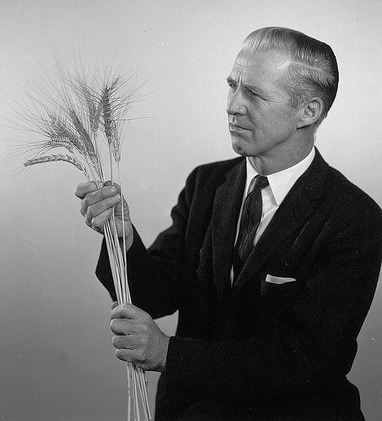 Photo: CIMMYTNorman Borlaug, father of the Green Revolution
Photo: CIMMYTNorman Borlaug, father of the Green Revolution
Why are we picking on a Nobel Peace Prize winner who’s often credited with “saving over a billion people worldwide from starvation“? This plant geneticist got Mexico, Pakistan, and India to adopt high-yield, disease-resistant seeds for wheat and other staple crops, upping their ability to produce food. But he also hooked them — and later, some African and Asian countries — on costly imported inputs such as synthetic nitrogen and chemical herbicides and pesticides. And now, in India, the brand of industrial ag championed by Borlaug stands on the brink of collapse — its heavy reliance on irrigation has essentially tapped out the water table in little more than a generation. And in Mexico, where Borlaug’s work as a plant breeder saw its first success, industrial ag and global markets have forced millions of small farmers off of the land, giving rise to the U.S. “immigration crisis” that so inflames the present-day Tea Partiers. No doubt, Borlaug’s innovations fed millions — but ultimately, they’ve been proven unsustainable, and the practices they entrenched threaten to plunge millions more into misery.
 Audrae Erickson, president of the Corn Refiners Association
Audrae Erickson, president of the Corn Refiners Association
Erickson may be just a minor player in the U.S. food tragedy, but she’s one of the loudest members of the chorus defending high-fructose corn syrup and other processed corn products. This president of the Corn Refiners Association first drew raves for her cyborg-like appearance in the 2007 documentary King Corn, barely blinking as she told the filmmakers why they couldn’t visit an HFCS factory. She now roams the Web like a sweet-tempered vigilante robot, singing the same song in the comments sections of hundreds of HFCS-damning posts, and she spearheaded the corny campaign to change HFCS’s name to “corn sugar.” For someone so fixated on jacking up the sweetness level of processed food, Erickson sure does manage to leave a bitter taste in our mouth.
Few agribusiness companies give us as many headaches as Bayer CropScience — and no, that doesn’t mean we’ll be buying aspirin from its parent company (you know, the one with the Nazi past). Its most spectacular recent act of villainy involves the global collapse of the honeybee population. Bayer Cropscience is the leading global producer of a nasty class of pesticides linked to the collapse of these criticial pollinators’ populations. The pesticides have been banned by several European countries (including Bayer’s fatherland, Germany). Rather than simply giving the poisons a rest to see if honeybee populations come back, Bayer is fighting like an angry wasp to keep them in heavy use here. That’s standard operating procedure for this company, which also makes antibiotics used in livestock production, and has charged like a bull against any attempts to regulate them despite evidence that their routine overuse is creating antibiotic-resistant bugs.
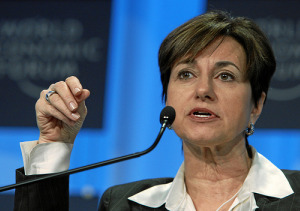 Photo: World Economic ForumPatricia Woertz, CEO, chairman, and president of Archer Daniels Midland
Photo: World Economic ForumPatricia Woertz, CEO, chairman, and president of Archer Daniels Midland
For decades, agribusiness giant Archer Daniels Midland has treated the U.S. corn belt — one of the globe’s greatest stores of natural soil fertility — the way an oil company treats an oil well: as something to be mined to the last drop. Propped up by a maddening tangle of government handouts, many of which it engineered itself through its legendary lobbying efforts, ADM bought corn cheap from U.S. farmers and sold it at tremendous profit in the form of such dubious products as high-fructose corn syrup and ethanol. And then, in 2006, when government goodies pushed ethanol production through the roof, ADM decided to to become the “Exxon of corn.” That’s when it hired Patricia Woertz, a longtime executive at Chevron, as its new CEO. Under Woertz, ADM’s plans for churning out huge profits by turning corn into car fuel haven’t always gone smoothly. But the company continues churning out that government-subsidized white lightning, and Midwestern cornfields continue losing soil and leeching fertilizer into the Gulf of Mexico, causing huge annual dead zones.
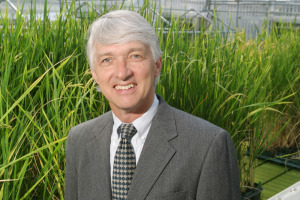 Roger Beachy, director of the National Institute of Food and Agriculture
Roger Beachy, director of the National Institute of Food and Agriculture
If Beachy had simply stayed chief of St. Louis-based Danforth Center, he’d be just another lieutenant in Monsanto’s empire. The nonprofit Danforth Center, which Beachy has led since its founding, is essentially Monsanto’s house research organization. But in 2009, President Obama plucked this career biotech champion from his Monsanto-funded perch and put him in charge of the US
DA’s $2 billion research budget. Any notion that he would keep an open mind to forms of agriculture that don’t toe Monsanto’s patent-friendly, industrial-scale line crumbled this spring. That’s when Grist’s Tom Philpott came face-to-face with him at an agriculture conference in Mexico and asked if he would consider funding research on organic farming. To paraphrase, not a chance. Moral of the story: Research shapes the future of agriculture, and our federal ag research budget is in the hands of a Monsanto man who’s openly hostile to organic ag.

